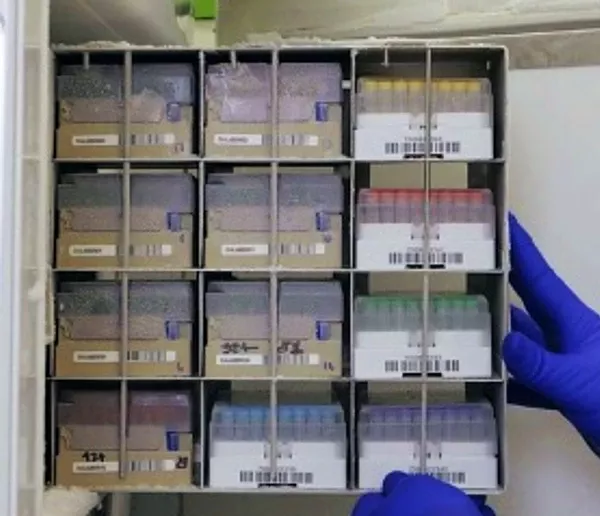The Rush University Cancer Center Biorepository Resource (RCCB) is a resource within the Rush basic science and clinical trials systems designed to provide key infrastructure to support the accrual of biospecimens from individuals being evaluated or treated for a malignancy at Rush or one of our clinical partner institutions. The strategic accrual, cryopreservation, and assembly of these resources dates back to 2004 and provides investigators with subject cohorts necessary to support specific translational biomedical research studies, as well as streamlining and facilitating collection for new prospective studies and clinical trials.
Our expansive and strategically-curated biorepository comprises clinical data and matched physical specimens of tissue, processed blood/PBMC products, and collaborative patient-derived organoid (PDO) specimens – our most extensive collections being patient plasma (in excess of 100,000 specimens) and patient serum (in excess of 50,000 specimens) many with time series and/or other matched specimen types available.
This resource provides investigators and clinicians the opportunity to play lead roles in the innovation of novel preventative, diagnostic and therapeutic approaches that will serve as a foundation by which we offer the latest in individualized therapy to our cancer patients.
You have many options for giving vehicles, multi-year commitments, and other opportunities to impact the RCCB and/or Dr. Borgia’s research. Make your gift today

Leadership
Jeffrey A. Borgia, PhD
Rush Cancer Center Biorepository Director
Phone: (312) 942-7837
jeffrey_a_borgia@rush.edu
Martice Herron
Head Clinical Coordinator
martice_a_herron@rush.edu
Kelly Cagin
Manager of Biorepository Operations
kelly_m_cagin@rush.edu
1750 W. Harrison St.
Jelke Building South, Suite 1411a
Chicago, IL 60612
Phone: (312) 942-7837
Support our work through a philanthropic gift
